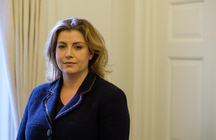Penny Mordaunt – 2018 Speech at Global Disability Summit
Below is the text of the speech made by Penny Mordaunt, the Secretary of State for International Development, on 24 July 2018.
It is wonderful to have you all here today, especially you your Excellency and the first lady of Ecuador. Here at the London Olympic Park – host to the world’s largest Paralympic Games in 2012 and the spiritual birthplace of the first-ever organised sporting event for disabled athletes in 1948.
I am delighted to be here today co-hosting this event with Government of Kenya and International Disability Alliance.
Thank you all for joining us today – and in particular, thanks to the Disabled Person’s Organisations and people with disabilities, who have led this Summit from conception to delivery.
Today, we have come together to work as partners and collectively step-up our efforts to improve the lives of people with disabilities around the world.
We are here to tackle the root causes of stigma, discrimination and abuse; to work towards inclusive education and employment for all. And to harness the power of technology, innovation and assistive devices for people with disabilities across the world.
Today we focus on moving from words to action; working together as partners; and holding ourselves and each other to account for our promises.
We are all starting from a low base – and the UK recognises we also have work to do as well and that is why today we will launch a range of dedicated policy and programming to champion the rights of the most marginalised and vulnerable people with disabilities.
We will launch ‘AT Scale’, a partnership for assistive technology (with partners such as USAID, WHO, UNICEF and GDI Hub) to transform access and affordability for life-changing Assistive Technology (AT) such as wheelchairs, prosthetics, hearing aids and glasses.
Access to AT is a critical enabler for inclusive education, economic empowerment and participation in communities. But at present only 10% of the 1 billion people in the world who need assistive products and services have access to them.
Our ambition is that 500m people globally will be being reached by essential assistive technology by 2030.
We are launching a DFID Scale Up on Inclusive Education – with a new education policy that has a clear promise for the most disadvantaged children. Through strengthening education programming; we commit to support countries including Ethiopia, Rwanda, Pakistan, Tanzania, Zimbabwe and Jordan.
In Ethiopia, we will transform and develop 687 Inclusive Education Resource Centres (IERCs) nationwide by 2022 to promote the inclusion of 24,000 children with disabilities.
In Rwanda, we will train 12,000 teachers of English and Maths in inclusive education teaching methods.
In Tanzania, we will support important reforms in primary and lower secondary schools to improve learning outcomes for all children particularly for girls and children with disabilities.
We are also launching the Disability Inclusive Development Programme – a new six-year cutting-edge innovation and scale-up programme to find out what works, for whom, when and why.
Through a ground-breaking consortium, led by Sightsavers, several UK International NGOs and Summit co-hosts, International Disability Alliance, the programme will deliver tangible outcomes to improve the lives of people with disabilities.
This includes improved educational attainment and health outcomes, jobs and livelihoods and reduced stigma and discrimination.
By 2024 we aim to enable up to 100,000 women, men, girls and boys with disabilities to access health services; up to 45,000 people with disabilities to increase their incomes; 10,000 children with disabilities to go to school and access education as well as reaching millions of people through interventions to tackle stigma and discrimination.
We are also committed to a DFID scale up on disability inclusion over the next 5 years and we will be publishing a new disability framework later this year, setting out how we would put disability at the heart of our work. And the legacy today will be a ten point Charter for Change which I would like us all to sign up to. This plan for action will be published and fully accessible. Progress will be monitored regularly and we will all be held accountable for our pledges. Empowering people with disabilities does not just affect the individuals – it leads to better decisions and more effective outcomes for communities, for nations and for the world.
Unless every one of our citizens can reach their full potential our nations never will. Let today be the start of our journey.
Now is the time.

